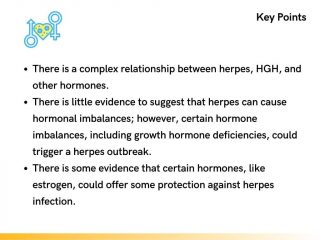HGH and Herpes: Can Herpes Cause Hormonal Imbalance?
There is a complex relationship between herpes and hormones, including human growth hormone or HGH.

Herpes is a common viral infection caused by the herpes simplex virus (HSV). There are two main types of herpes simplex virus: HSV-1 and HSV-2. HSV-1 primarily infects the oral and facial areas. It is often responsible for cold sores or fever blisters, which are painful sores that typically appear on or around the lips. HSV-2 primarily infects the genital and anal areas, leading to genital herpes. However, it can also infect the mouth and cause oral herpes through oral-genital contact.
Both types of herpes simplex virus are chronic infections, meaning they can persist in the body for life. Stress and hormonal changes, such as during adolescence and a woman’s menstrual cycle, could trigger herpes outbreaks. There is also a link between HGH and herpes, as your HGH level can directly and indirectly trigger a herpes outbreak or influence your susceptibility to being infected with the virus.
Connection Between HGH and Herpes
Human growth hormone (HGH) is a crucial hormone in the human body, responsible for various functions, including growth and development.
On the other hand, herpes is a viral infection caused by the herpes simplex virus (HSV), which can lead to painful outbreaks of sores or blisters. While the two may seem unrelated, some studies have suggested a potential connection between HGH and herpes outbreaks.
Before we explore the possible connection between HGH and herpes, let’s first understand a little more about HGH. HGH is produced by the pituitary gland and plays a vital role in promoting growth and development during childhood and adolescence. It also continues to have important functions in adulthood, including regulating metabolism, supporting the immune system, and maintaining healthy organs and tissues. HGH levels typically decline with age, leading some individuals to consider HGH supplementation as a means of countering the effects of aging.
As to the possible link between HGH and herpes, herpes outbreaks are primarily triggered by factors such as stress, a weakened immune system, or exposure to sunlight. While there is no direct evidence to suggest that HGH itself causes herpes outbreaks, hormone imbalances such as a growth hormone deficiency (GHD) can affect the immune system’s ability to control the herpes virus.
- Weakened Immune Response: HGH deficiencies or imbalances can weaken the immune system’s ability to suppress herpes outbreaks. This is because HGH plays a role in supporting the immune system’s function. A compromised immune system is less effective at keeping the herpes virus in check, potentially leading to more frequent or severe outbreaks.
- Stress-Related Hormone Fluctuations: Stress is a known trigger for herpes outbreaks. Stress can lead to hormone fluctuations, including those related to HGH, which in turn may increase the likelihood of a herpes outbreak. Managing stress and maintaining a healthy hormonal balance can help reduce the risk of outbreaks.
The Basics of Herpes and Hormonal Imbalance
Herpes outbreaks are influenced by various hormonal factors, not just HGH. Here are some key aspects of this complex relationship between herpes and other hormone and hormonal changes.
- Cortisol: High levels of stress can lead to increased production of cortisol, a stress hormone, which can suppress the immune system and trigger herpes outbreaks. Managing stress and cortisol levels can help mitigate this risk.
- Estrogen and Progesterone: Hormonal changes in women, particularly during menstruation, pregnancy, or menopause, can influence herpes outbreaks. Fluctuations in estrogen and progesterone levels may weaken the immune system, making it easier for the virus to reactivate.
- Testosterone: Some studies suggest that testosterone levels may play a role in herpes outbreaks. Low testosterone levels may be associated with a weakened immune response, potentially increasing the likelihood of outbreaks in men.
Examining the Role of HGH in Herpes Outbreaks
While there is little direct evidence to suggest that HGH causes herpes outbreaks, hormone imbalances, including those related to HGH, can impact the immune system’s ability to control the herpes virus. Stress-related hormone fluctuations and changes in estrogen, progesterone, and testosterone levels may also contribute to the occurrence of outbreaks. Therefore, maintaining a healthy hormonal balance, managing stress, and supporting the immune system are essential steps in reducing the risk of herpes outbreaks. Individuals experiencing frequent or severe outbreaks should consult a healthcare professional for guidance on managing their condition and hormone levels effectively.
If you are found to have a hormonal imbalance that is influencing your herpes outbreaks, you may be a candidate for hormone therapy, such as growth hormone therapy or testosterone therapy.
Can Herpes Cause Hormonal Imbalance?

The idea that herpes can cause a hormonal imbalance is a bit of a myth. The misunderstanding probably arose since herpes outbreaks tend to correspond to times of “hormonal stress,” such as during a woman’s menstrual cycle or as teens enter puberty.
While there is no evidence that herpes can directly cause a hormonal imbalance, there are a few ways in which herpes may indirectly affect hormonal balance, such as:
- Stress: Herpes outbreaks can be triggered or exacerbated by stress. When a person is stressed, the body releases stress hormones like cortisol, which can disrupt the normal balance of hormones in the body. Chronic stress can potentially lead to hormonal imbalances over time.
- Immune System Response: Herpes outbreaks occur when the immune system is unable to fully suppress the virus. An overactive or weakened immune system can potentially impact hormone production and regulation, as the immune system and hormonal systems in the body are interconnected.
Herpes, Hormones, and the Immune System
The connection between herpes and hormones, particularly female sex hormones, has been a topic of research interest for many years. The role of hormones, particularly estrogen and progesterone, in the immune response and particularly in offering some protection against the herpes infection has been shown in recent studies.
Many women with genital herpes report that their outbreaks coincide with hormonal changes, such as menstruation, pregnancy, and menopause. These observations have led researchers to investigate the potential impact of female sex hormones on herpes infections. Estrogen, one of the primary female sex hormones, has been the focus of several studies in relation to herpes. Studies in mice, like the one linked above, have suggested that high levels of estrogen may have a protective effect against HSV-2 infection.
Another study, this one published in the Journal of Virology, found that mice treated with estrogen had a reduced susceptibility to genital herpes infection compared to untreated mice. Estrogen is believed to enhance the body’s immune response and reduce viral replication, which may explain its potential protective effect.
It’s important to note that the effects of hormones on herpes may not be limited to HGH or male or female sex hormones alone. The interplay between various hormones and the immune system is complex and can influence herpes infection outcomes.
Strategies for Herpes Management and Hormonal Harmony
While HGH and other hormone balances may have a role to play in herpes, the primary ways to manage herpes are with antiviral medications and taking measures to avoid infection or spreading the infection if you have it. Besides being treated with antivirals, over-the-counter pain medications and warm baths or compresses may relieve the pain associated with oral herpes or genital sores.
Taking measures to reduce stress, eating well, getting enough sleep, and regular exercise can keep your immune system strong and your critical hormones such as HGH and testosterone high, which can help prevent herpes infection.
Navigating the Complex Interplay Between HGH, Herpes, and Hormonal Balance
The relationship between HGH, hormones, and herpes is complex and may vary between individuals. Further research is needed to better understand these interactions and their clinical implications in minimizing herpes outbreaks. It’s also important to note that while hormonal influences such as HGH levels may play a role, safe and effective antiviral medications remain the primary approach to managing herpes infections in humans.
